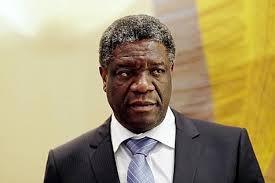By
Sylvain Muyali
The surgeon is honored for his work near Bukavu, Democratic Republic of the Congo, where he has treated more than 40,000 victims of rape since 1996.
President of the European Parliament Martin Schulz acknowledged Dr Denis Mukwege‘s remarkable character and honored the man who fights for women’s dignity, justice and peace in his country. “You have to fight impunity and prosecute criminals responsible for mass rape as a weapon of war and terror against the weak and innocent human beings,” said Schulz.
It is a reward more of a lifetime’s fight for Dr Mukwege, who has run the clinic since 1998 in Panzi, Bukavu, DRC. The Congolese gynaecologist surgeon on Wednesday received the Sakharov Prize from the European Parliament in Strasbourg in honor of his courage in North Kivu where, since opening the health centre, he has cared for more than 40,000 women, victims of sexual violence in the region.
I receive any reward “with great humility and great hope,” he said, recalling that the province of Kivu had over the years paid the consequences of an “economic and crass” war. “The area where I live is one of the richest in the world…….[where] the female body has become a battlefield, and rape is used as a weapon of war,” the surgeon stated in his speech.
“My father and I pray I will care”
Mukwege’s inspiration was his father, a Pentecostal pastor, from whom he inherited his vocation to help others. “I admired him. When he preached as a pastor and went out to meet the sick, I accompanied him because I liked to see it in action,” said the surgeon.
There was recollection of a time when his father was called to the bedside of a dying baby. Helpless, the pastor could only offer prayers to the family child, while his son thought, “I need to become a doctor, and my father and I pray I will care.” His vocation was born. Denis Mukwege at this time was eight years old.
After studying medicine in Burundi, Bujumbura, in 1978, and a first post at Lemera Hospital, DRC, he moved on to a specialist gynaecological role in Angers, France. It was here that, with the assistance of Belgian specialist Guy Bernard Cadiere, he learnt the then revolutionary technique, laparoscopy, a minimally invasive surgery that would prove invaluable in the treatment of lesions in his patients at Panzi Hospital, DRC.
In 1998 he left Angers for the DRC after which followed years of war, the consequences of the Rwandan genocide, at that time laying the foundations of his clinic with the help of the Swedish and British associations of the European Union. The first rape victim was in 1999. “This woman was raped 500 metres from the hospital,” he recalls, “At the time, I knew it would be the beginning of thousands more vicitms.”
“Our country is sick but together……we will treat them”
On November 26th the European Parliament announced “A major challenge for the coming century: To reduce violence against women.” Mukwege in his speech on receiving the Sakharov Prize referred to the victims in Kivu, citing one example of the atrocities, a raped child of 18 months, alongside “the economic horror that leads us to the spinelessness, nihilism without conscience, and finally to barbarism.”
On being awarded the Prize, Mukwege stated “For this prize, you have decided to increase the visibility of the struggle of Congolese women for over 15 years and recognise their suffering, but also the dignity and courage they embody.”
“Every woman raped, I identify with, my wife, every mother raped and child violated; how silent are we knowing these crimes against humanity are planned with such insensitivity?” asked Mukwege.
Addressing the “Congolese people” Denis Mukwege finally explained that the award he received was “the symbol of freedom of thought, a right that was taken away from us….which, following terror and oppression, we sometimes seem to have given up. “
He concluded: “Today, everything above and to the world, Europe expresses its solidarity. She wants to walk with us in our quest for the restoration of a worthy Congolese life, so once and for all, peace and justice are restored in the Congo and we can aspire to a better future.”
The Sakharov Prize
The Sakharov Prize for Freedom of Thought is awarded each year by the European Parliament. It was created in 1988 to honor collective or individual personalities who strive to defend human rights and fundamental freedoms. Malala Yousafzai won the award last year for her fight for girls’ education in Pakistan. Winners receive the sum of 50,000 euros.


